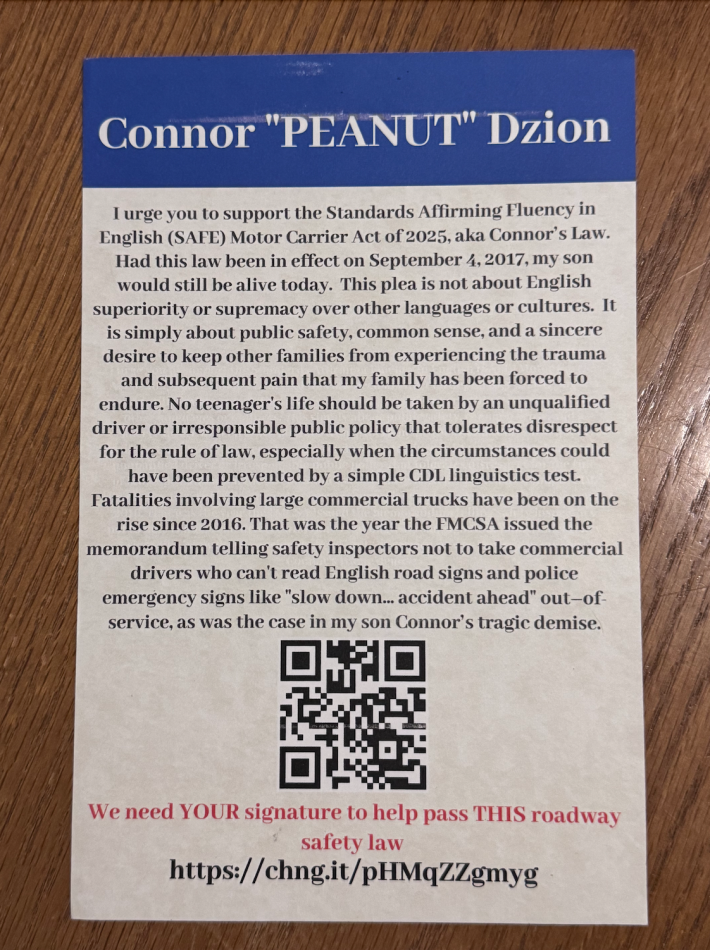The Trump administration is cracking down on improperly licensed truck drivers who can't speak English — but some advocates fear that a longstanding bipartisan safety issue will get swamped by the president's divisive rhetoric.
Over the last few months, federal transportation officials have sparked controversy with a series of policies to, as Transportation Secretary Sean Duffy put it in press releases and an exclusive op-ed for the far-right outlet Breitbart, stop "treating English as a backseat language" and get "illegals" out from behind the wheel of big rigs.
Duffy didn't even try to appeal to anyone on the other side of the aisle, blaming the Biden administration's "broken border policies [that] flooded the country with more than 10 million illegal aliens" for the number of foreign-born truckers on U.S. roads, which doubled between 2000 and 2021 and rose to about 18 percent of all drivers on the road. The Secretary, though, implied this surge was a danger to U.S. labor interests, rather than an asset to the industry during a truck driver shortage.
"We will not allow the last administration’s importation of cheap labor to undermine hard-working American truck drivers," he added.
Perhaps the most controversial of those new policies was a stricter new enforcement procedure if truckers fail to meet English proficiency standards, which prompted outrage about how the policy might be perverted to fuel the administration's aggressive anti-immigrant policies — and more than a few jokes about truckers being asked to recite Chaucer roadside.
@bigrig.dispatcher Carriers & drivers, Arkansas has already started fines and arrests for not reading and writing English. Is this a trend that more states will follow? Will this tighten capacity and push rates 🆙 Let us know in the comments. #truckersoftiktok #owneroperator #truckingindustry
♬ original sound - BigRig Dispatchers
Advocates expressed fear that thick accents or poor communication skills could become an easy pretext for police to harass truckers who law enforcement officers don't read as American — particularly drivers who aren't white. And if state and local police are deputized to perform ICE functions, some fear it could speed mass deportation efforts, too.
Truck safety advocates, though, have a different fear: that the Trump administration's MAGA rhetoric is warping what would normally be considered a straightforward safety need. And over time, they worry it could erode progressive support for urgently needed policies that could save lives.
"Dressed up in the trappings of 'America First,' you could make this sound very xenophobic — and they are," said Zach Cahalan of the Truck Safety Coalition. "But [this is about] enforcing an existing statute that keeps people safe."
'100 percent necessary'
Despite the Trump administration's far-right spin on the issue, truckers on U.S. roads have always been required to speak at least enough English to pass written tests, navigate vehicle inspections, and hold basic conversations with law enforcement, in addition to reading roadside signs, Cahalan pointed out.
Keyboard warriors might assume it's not hard for a non-English speaker to learn to read the four letters on a Stop sign, but it is harder for a driver who can only read, say, Cyrillic or Hindi — or one who is confronted with a variable messaging sign that warns motorists of an upcoming hazard.
In 2016, though, the Obama administration downgraded the penalties for commercial drivers who didn't meet English proficiency requirements to a simple citation, rather than putting their vehicles immediately out of service. Proponents of the change argued that conversational fluency isn't necessary for operating a truck safely, and that interpreters and translation apps could fill the gap when necessary to deal with inspectors and law enforcement — and that there hasn't been significant research into whether bad English skills equate to bad safety records on the road.
Research or not, Cahalan said there is a real problem — and advocateslike Mellissa Dzion is living proof.

Dzion's son Connor, 18, was struck from behind by a trucker traveling at nearly 70 miles per hour. The crash occurred in 2017 — just one year after English proficiency penalties for truckers was relaxed.
That trucker, Yadwinder Sangha, was driving for a Montreal-based carrier when he arrived at the long traffic back-up where first responders were trying to clear a different crash. (That collision had been caused, coincidentally, by another truck driver with an improperly issued commercial driver's license, who was later found to have been texting behind the wheel.)
Sangha had not heeded emergency warning signs urging motorists to be prepared to stop; he hadn't even turned his cruise control off.
It's unclear if Sangha's lack of proficiency in English led to Connor Dzion's death; Sangha was allegedly on his 25th hour of service, which would have left him fatigued and in flagrant violation of U.S. laws that require truckers to drive no more than 14 hours in a single day. He could have been distracted, like the other trucker involved in the other crash that day; and Sangha returned to Canada before lawyers for the Dzion family could get him to produce his cell phone records.
Still, Dzion is nagged by the fact that Sangha simply couldn't read a road sign that might have compelled him to be more alert before the crash. When law enforcement arrived to question him, he could speak so little English that he needed a translator to give basic testimony about what went wrong.
"If the driver of the semi that hit my son had been able to read the English language, then he would have known and understood that command — and possibly have saved my son's life, [not to mention] the devastation of the other 21 vehicles that he also totaled and the 13 other people he sent to the hospital," said Dzion. "I mean, the man could speak zero English. ... So yeah, I'm pretty adamant that English language proficiency is absolutely 100 percent necessary to save lives."

In the years since her son's death, Dzion has made it her quest to save other mothers from the pain she experienced, starting with what she sees as the lowest-hanging fruit: enforcing English proficiency requirements for every big-rig driver on the road. In March, she allowed her son's name to be attached to the Standards Affirming Fluency in English (SAFE) Motor Carrier Act of 2025 — now known simply as "Connor's Law" — which would put commercial drivers out of service if they can't pass an English language proficiency test.
That bill caught a major updraft in late April, when President Trump issued an executive order requiring the U.S. Department of Transportation to crack down on non-English-speaking drivers — including requiring the Federal Motor Carrier Safety Administration to issue new guidance that would essentially put Connor's Law into practice before Congress can codify it into permanent policy.
Getting a boost from one of the most divisive presidents in American history, though, has come with baggage — and a lot of online abuse.
"I have been called a racist, I have been called a fascist, I have been called a bigot," said Dzion. "Too many people are saying this is a racist law. But it has nothing to do with racism. It's a common-sense law dealing with the safety of human lives."
'An open secret'
Cahalan of the Truck Safety Coalition fears that the English proficiency requirement isn't the only Trump-era trucking reform that will get smeared as inherently racist – even though he says other policies in the president's executive order could save lives, too.
One that the Coalition particularly applauds is the administration's recently announced audit of states' "non-domiciled" commercial driver's license programs, which allows certain states to issue licenses to people who don't live within their jurisdiction.
Most of the people who get non-domiciled CDLs are indeed residents of other countries, who might not have the English skills to pass the exam. But some are issued to Americans who are "domiciled in another state while that state is prohibited from issuing CDLs for some reason," the FMCSA writes; recent data from Overdrive suggests that more than 60,000 drivers on the road today have them.
Regardless of why they're getting them, Cahalan says that a disturbing number of truckers of all nationalities obtain their non-domiciled CDLs through shady training centers known as CDL "mills," which simply feed test answers to students so they can pass tests quickly without providing enough training to safely operate a large truck.
Some CDL mills, meanwhile, don't even bother to train their drivers at all. Another recent investigation in Washington state found one "school" that had bribed an independent tester to pass unprepared students in exchange for envelopes full of cash tagged with the student's birthday; 80 percent of the 877 students who were eventually retested by legitimate examiners failed.
In Florida, meanwhile, a group of DMV workers was recently arrested for allegedly selling non-domiciled CDLs to hundreds of people who hadn't even received fraudulent training. A Massachusetts state trooper also passed students in exchange for random handouts, like free cases of Fiji water and Swedish Fish, as well as a $2,000 snowblower and a granite mailbox.

Regardless of why they couldn't pass the test, Cahalan says holders of fraudulently obtained CDLs have no place on U.S. roads — whether they're "domiciled" or not. And because CDL mills and bribable testers will work with anyone who can pay, a lot of home-grown drivers are dangerously unqualified, too.
"If you haven't done what you have to do to legally obtain that license, you're a danger to anyone on the road," said Cahalan. "And it's kind of an open secret that there are a lot of people driving with CDLs who don't have the qualifications. ... The issue around non-domiciled CDLs is relevant, and no one's really looked at it, ever. There's a real concern that these are being issued inappropriately."
In his release about the audit, though, Duffy framed CDL fraud purely as a byproduct of "the open borders policies of the last administration, [which] allowed millions to flood our country – leading to serious allegations that the trucking licensing system is being exploited."
That narrow anti-immigrant rhetoric, experts say, is distracting Americans from much larger safety problems that deserve federal attention — and positioning what should be safety concerns for everyone as a far-right boogeyman.
"If you can’t follow traffic laws because of a language barrier, that’s a problem. But let’s not pretend like language is the only thing separating a professional from a liability on the road," transportation consultant Adam Wingfield wrote in FreightWaves. "The CDL system has been a factory for years — an assembly line for moving bodies into trucks as fast as possible. ... Bad schools, minimal oversight, states chasing licensing revenue – it all snowballed into what we have now."
'We all bleed red'
Advocates like Cahalan and Dzion are fully aware that support for policies like English proficiency standard enforcement and CDL reform have gained a new charge now that those policies have been openly embraced by the Trump administration. And they're not naïve to the possibility that these policies could be wielded against immigrants in harmful ways that they wouldn't support — even as they admit they don't have all the answers on how to wield them well. (Streetsblog reached out to four different immigrant advocacy and civil rights organizations to be interviewed for this story, but did not receive a response.)
Still, Dzion can't accept that nothing can be done to make sure that every truck driver who takes to the road is truly prepared to be there — starting with making sure that they can simply read the road signs.
"We all bleed red," said Dzion. "If you worship a different God than I do, that does not make your life any less significant than mine or my child's; it's still a human life. I don't care who relaxed the law the year before my son lost his life; the fact still remains that it was relaxed, and if it hadn't been, then my son could possibly still be alive.
"Do I know for a fact he would be? No," Dzion continued. "But the possibility is there. And if it is, I'm not going to stop fighting for the next mother — to keep her child alive."






